-
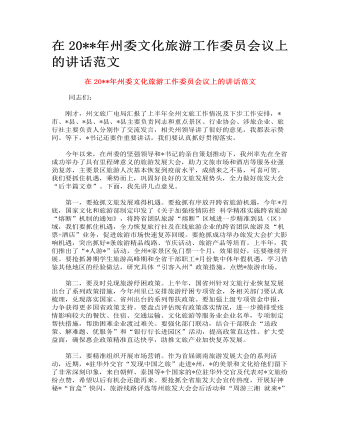
在州委文化旅游工作委员会议上的讲话范文
第一,要抢抓文旅发展难得机遇。要抢抓有序放开跨省旅游机遇,今年*月底,国家文化和旅游部制定印发了《关于加强疫情防控科学精准实施跨省旅游“熔断”机制的通知》,将跨省团队旅游“熔断”区域进一步精准到县(区)域,我们要抓住机遇,全力恢复旅行社及在线旅游企业的跨省团队旅游及“机票+酒店”业务,促进旅游市场快速复苏回暖。要抢抓成功举办旅发大会扩大影响机遇,突出抓好*条旅游精品线路、节庆活动、旅游产品等培育。上半年,我们推出了“*人游*”活动,全州*家景区免门票一个月,效果很好,还要继续开展。要抢抓暑期学生旅游高峰期和全省干部职工*月份集中休年假机遇,学习借鉴其他地区的经验做法,研究具体“引客入州”政策措施,点燃*旅游市场。 第二,要及时兑现旅游纾困政策。上半年,国省州针对文旅行业恢复发展出台了系列政策措施,今年州里已安排旅游纾困专项资金,各相关部门要认真梳理,兑现落实国家、省州出台的系列帮扶政策。要加强上级专项资金申报,力争获得更多国省政策支持。要盘点评估现有政策落实情况,进一步摸排受疫情影响较大的餐饮、住宿、交通运输、文化旅游等服务业企业名单,专项制定帮扶措施,帮助困难企业渡过难关。要强化部门联动,结合干部联企“送政策、解难题、优服务”和“银行行长进园区”活动,提高政策直达性、扩大受益面,确保惠企政策精准直达快享,助推文旅产业加快复苏发展。 第三,要精准组织开展市场营销。作为首届湖南旅游发展大会的系列活动,近期,*驻华外交官“发现中国之旅”走进*州,*的美景和文化给他们留下了非常深刻印象,来自朝鲜、泰国等*个国家的*位驻华外交官及代表对*文旅纷纷点赞,希望以后有机会还能再来。要抢抓全省旅发大会宣传热度,开展好神秘*“盲盒”快闪,旅游线路评选等州旅发大会会后活动和“周游三湘 就来*”推广活动。要组织客源市场营销“小分队”,在长沙、广州等重点客源城市开展精准营销,与重庆、湖北、广东等地洽谈合作细节。鼓励各县市区围绕旅发大会、暑期旅游市场策划各类营销活动,办好湖南省夏季乡村旅游节、*旅拍节第节庆活动,营造浓厚宣传营销氛围。要树立全州“一盘棋”思想,强化整体形象包装,建立健全全州旅游宣传互推、智慧旅游、旅游通达、零客互推、利益共享等保障机制,改变过去各县市区文旅宣传互推“各自为政”力量分散的现状,加快构建旅游联动发展大格局。同时,要加大文化旅游资源整合,加快组建州级文化旅游投资集团公司,加大文旅龙头企业引进和培育力度,支持文旅企业参与市场竞争、不断做大做强。
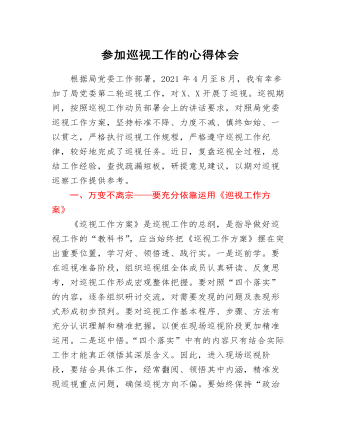
参加巡察巡视工作的经验总结(心得体会)
一、万变不离宗——要充分依靠运用《巡视工作方案》《巡视工作方案》是巡视工作的总纲,是指导做好巡视工作的“教科书”,应当始终把《巡视工作方案》摆在突出重要位置,学习好、领悟透、践行实。一是巡前学。要在巡视准备阶段,组织巡视组全体成员认真研读、反复思考,对巡视工作形成宏观整体把握。要对照“四个落实”的内容,逐条组织研讨交流,对需要发现的问题及表现形式形成初步预判。要对巡视工作基本程序、步骤、方法有充分认识理解和精准把握,以便在现场巡视阶段更加精准运用。二是巡中悟。“四个落实”中有的内容只有结合实际工作才能真正领悟其深层含义。因此,进入现场巡视阶段,要结合具体工作,经常翻阅、领悟其中内涵,精准发现巡视重点问题,确保巡视方向不偏。要始终保持“政治巡视”的站位,突出巡视工作的政治属性,善于把发现的具体问题上升到“讲政治”的层面理解把握,避免将政治巡视误解为工作督导检查。三是巡后核。现场巡视结束后,进入巡视报告的撰写修改和问题底稿的审核阶段,更要经常对照《巡视工作方案》校准调整。要对照“四个落实”,对巡视工作报告进行修改完善,看问题定性是否准确、依据是否合规;看中心是否偏移、特点是否鲜明;看重点是否突出、结构是否合理。
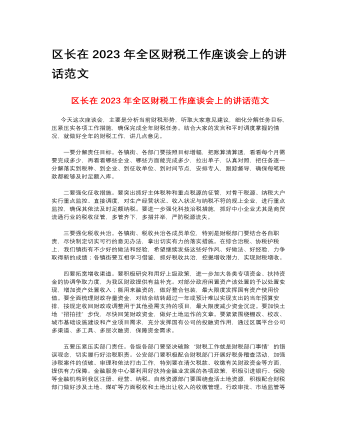
区长在2023年全区财税工作座谈会上的讲话范文
今天这次座谈会,主要是分析当前财税形势,听取大家意见建议,细化分解任务目标,压紧压实各项工作措施,确保完成全年财税任务。结合大家的发言和平时调度掌握的情况,就做好全年的财税工作,讲几点意见。一要分解责任目标。各镇街、各部门要按照目标增幅,把账算清算透,看看每个月需要完成多少,再看看哪些企业、哪些方面能完成多少,拉出单子,认真对照,把任务逐一分解落实到税种、到企业、到征收单位、到时间节点,安排专人,跟踪督导,确保每笔税款都能够及时足额入库。二要强化征收措施。要突出抓好主体税种和重点税源的征管,对骨干税源、纳税大户实行重点监控、直接调度,对生产经营状况、收入状况与纳税不符的规上企业,进行重点监控,确保其依法及时足额纳税。要进一步强化科技治税措施,抓好中小企业尤其是商贸流通行业的税收征管,多管齐下,多措并举,严防税源流失。
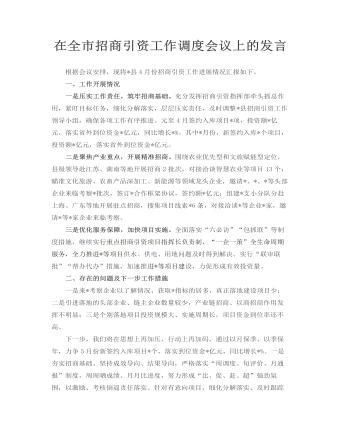
在全市招商引资工作调度会议上的发言
根据会议安排,现将*县4月份招商引资工作进展情况汇报如下。一、工作开展情况一是压实工作责任,筑牢招商基础。充分发挥招商引资指挥部牵头抓总作用,紧盯目标任务,细化分解落实,层层压实责任,及时调整*县招商引资工作领导小组,确保各项工作有序推进。元至4月签约入库项目*项,投资额*亿元,落实省外到位资金*亿元,同比增长*%。其中*月份,新签约入库*个项目,投资额*亿元,落实省外到位资金*亿元。二是聚焦产业重点,开展精准招商。围绕农业优先型和文旅赋能型定位,县级领导赴江苏、湖南等地开展招商2批次,对接洽谈智慧农业等项目13个;瞄准文化旅游、农畜产品深加工、新能源等领域龙头企业,邀请*、*、*等头部企业来临考察*批次,签订*合作框架协议,签约额*亿元;组建*支小分队分赴上海、广东等地开展驻点招商,搜集项目线索*6条,对接洽谈*等企业*家,邀请*等*家企业来临考察。
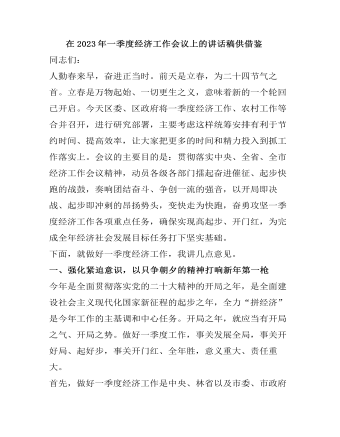
在2023年一季度经济工作会议上的讲话稿供借鉴
同志们:人勤春来早,奋进正当时。前天是立春,为二十四节气之首。立春是万物起始、一切更生之义,意味着新的一个轮回已开启。今天区委、区政府将一季度经济工作、农村工作等合并召开,进行研究部署,主要考虑这样统筹安排有利于节约时间、提高效率,让大家把更多的时间和精力投入到抓工作落实上。会议的主要目的是:贯彻落实中央、全省、全市经济工作会议精神,动员各级各部门擂起奋进催征、起步快跑的战鼓,奏响团结奋斗、争创一流的强音,以开局即决战、起步即冲剌的昂扬势头,变快走为快跑,奋勇攻坚一季度经济工作各项重点任务,确保实现高起步、开门红,为完成全年经济社会发展目标任务打下坚实基础。下面,就做好一季度经济工作,我讲几点意见。
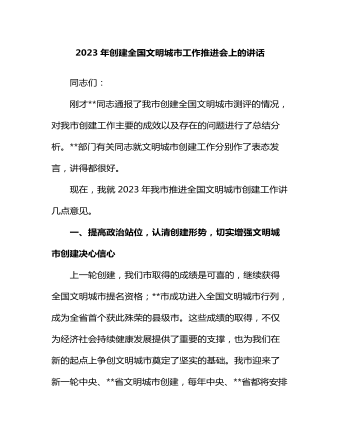
2023年创建全国文明城市工作推进会上的讲话
同志们:刚才**同志通报了我市创建全国文明城市测评的情况,对我市创建工作主要的成效以及存在的问题进行了总结分析。**部门有关同志就文明城市创建工作分别作了表态发言,讲得都很好。现在,我就2023年我市推进全国文明城市创建工作讲几点意见。一、提高政治站位,认清创建形势,切实增强文明城市创建决心信心 上一轮创建,我们市取得的成绩是可喜的,继续获得全国文明城市提名资格;**市成功进入全国文明城市行列,成为全省首个获此殊荣的县级市。这些成绩的取得,不仅为经济社会持续健康发展提供了重要的支撑,也为我们在新的起点上争创文明城市奠定了坚实的基础。我市迎来了新一轮中央、**省文明城市创建,每年中央、**省都将安排测评组进行实地测评、网上申报材料,满意度问卷调查。今年是全国文明城市和**省文明城市创建周期年,做好今年工作,影响深远、十分重要。头年的分数占比虽只为15%,但对于创建的信心起到很关键的作用,也能很好地为明年奠定坚实的基础。
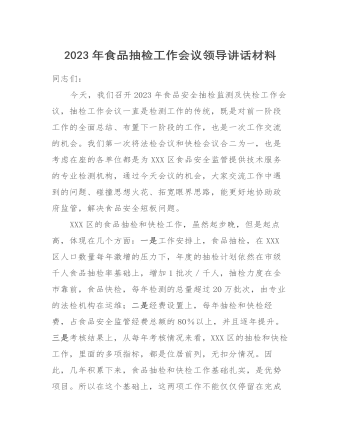
2023年食品抽检工作会议领导讲话材料
同志们:今天,我们召开2023年食品安全抽检监测及快检工作会议,抽检工作会议一直是检测工作的传统,既是对前一阶段工作的全面总结、布置下一阶段的工作,也是一次工作交流的机会。我们第一次将法检会议和快检会议合二为一,也是考虑在座的各单位都是为XXX区食品安全监管提供技术服务的专业检测机构,通过今天会议的机会,大家交流工作中遇到的问题、碰撞思想火花、拓宽眼界思路,能更好地协助政府监管,解决食品安全短板问题。XXX区的食品抽检和快检工作,虽然起步晚,但是起点高,体现在几个方面:一是工作安排上,食品抽检,在XXX区人口数量每年激增的压力下,年度的抽检计划依然在市级千人食品抽检率基础上,增加1批次/千人,抽检力度在全市靠前,食品快检,每年检测的总量超过20万批次,由专业的法检机构在运维;二是经费设置上,每年抽检和快检经费,占食品安全监管经费总额的80%以上,并且逐年提升。三是考核结果上,从每年考核情况来看,XXX区的抽检和快检工作,里面的多项指标,都是位居前列,无扣分情况。因此,几年积累下来,食品抽检和快检工作基础扎实,是优势项目。
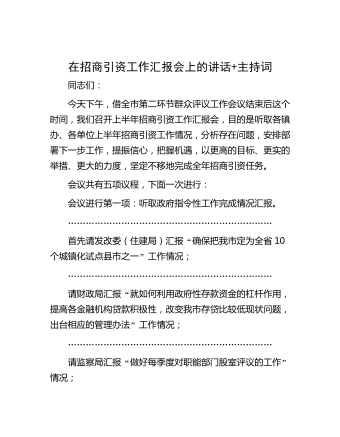
在招商引资工作汇报会上的讲话+主持词
同志们: 今天下午,借全市第二环节群众评议工作会议结束后这个时间,我们召开上半年招商引资工作汇报会,目的是听取各镇办、各单位上半年招商引资工作情况,分析存在问题,安排部署下一步工作,提振信心,把握机遇,以更高的目标、更实的举措、更大的力度,坚定不移地完成全年招商引资任务。会议共有五项议程,下面一次进行:会议进行第一项:听取政府指令性工作完成情况汇报。……………………………………………………………首先请发改委(住建局)汇报“确保把我市定为全省10个城镇化试点县市之一”工作情况;……………………………………………………………请财政局汇报“就如何利用政府性存款资金的杠杆作用,提高各金融机构贷款积极性,改变我市存贷比较低现状问题,出台相应的管理办法”工作情况;……………………………………………………………请监察局汇报“做好每季度对职能部门股室评议的工作”情况;
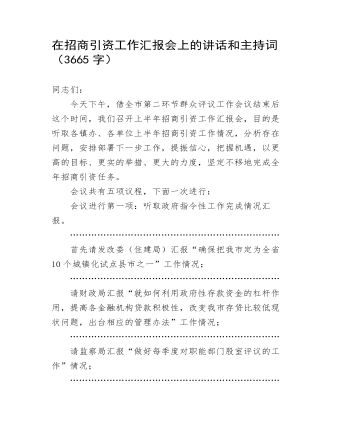
在招商引资工作汇报会上的讲话和主持词(3665字)
同志们:今天下午,借全市第二环节群众评议工作会议结束后这个时间,我们召开上半年招商引资工作汇报会,目的是听取各镇办、各单位上半年招商引资工作情况,分析存在问题,安排部署下一步工作,提振信心,把握机遇,以更高的目标、更实的举措、更大的力度,坚定不移地完成全年招商引资任务。会议共有五项议程,下面一次进行:会议进行第一项:听取政府指令性工作完成情况汇报。……………………………………………………………首先请发改委(住建局)汇报“确保把我市定为全省10个城镇化试点县市之一”工作情况;……………………………………………………………请财政局汇报“就如何利用政府性存款资金的杠杆作用,提高各金融机构贷款积极性,改变我市存贷比较低现状问题,出台相应的管理办法”工作情况;……………………………………………………………请监察局汇报“做好每季度对职能部门股室评议的工作”情况;……………………………………………………………请政府办汇报“建立一套更为完善、更为科学的督查机制”工作情况;………………………………………………
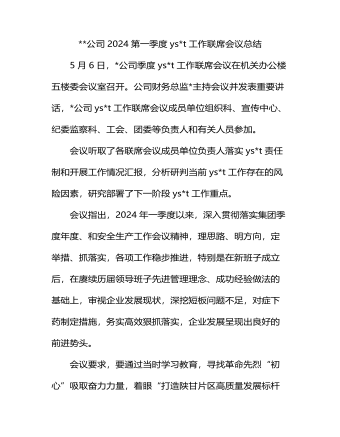
公司2024第一季度意识形态工作联席会议总结
一是要把好正确导向。严格落实主体责任,逐条逐项细化任务,层层传导压力。要抓实思想引领,把理论学习贯穿始终,全身心投入主题教育当中;把理论学习、调查研究、推动发展、检视整改等有机融合、一体推进;坚持学思用贯通、知信行统一,努力在以学铸魂、以学增智、以学正风、以学促干方面取得实实在在的成效。更加深刻领会到******主义思想的科学体系、核心要义、实践要求,进一步坚定了理想信念,锤炼了政治品格,增强了工作本领,要自觉运用的创新理论研究新情况、解决新问题,为西北矿业高质量发展作出贡献。二是要加强应急处事能力。认真组织开展好各类理论宣讲和文化活动,发挥好基层ys*t阵地作用,加强分析预警和应对处置能力,提高发现力、研判力、处置力,起到稳定和引导作用。要坚决唱响主旋律,为“打造陕甘片区高质量发展标杆矿井”、建设“七个一流”能源集团和“精优智特”新淄矿营造良好的舆论氛围。三是加强舆情的搜集及应对。加强职工群众热点问题的舆论引导,做好舆情的收集、分析和研判,把握时、度、效,重视网上和网下舆情应对。
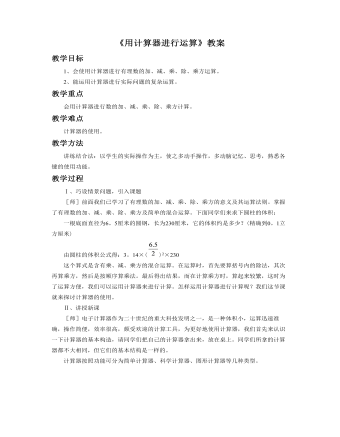
利用计算器进行有理数的计算教案教学设计
计算器的面板是由键盘和显示器组成的。显示器是用来显示输入的数据和计算结果的装置。显示器因计算器的种类不同而不同,有单行显示的,也有双行显示的。在键盘的每个键上,都标明了这个键的功能。我们看键盘上标有的键,是开机键,在开始使用计算器时先要按一下这个键,以接通电源,计算器的电源一般用5号电池或钮扣电池。再看键,是关机键,停止使用计算器时要按一下这个键,来切断计算器的电源,是清除键,按一下这个键,计算器就清除当前显示的数与符号。的功能是完成运算或执行命令。是运算键,按一下这个键,计算器就执行加法运算。
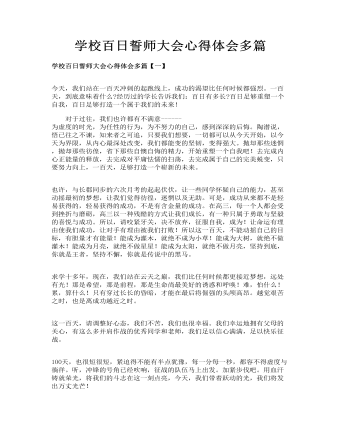
学校百日誓师大会心得体会多篇
也许,与长郡同步的六次月考的起起伏伏,让一些同学怀疑自己的能力,甚至动摇最初的梦想,让我们觉得彷徨,迷惘以及无助。可是,成功从来都不是轻易获得的,轻易获得的成功,不是有含金量的成功。在高三,每一个人都会受到挫折与磨砺,高三以一种残酷的方式让我们成长,有一种只属于勇敢与坚毅的喜悦与成功。所以,请咬紧牙关,决不放弃,征服自我,成为!让命运有理由使我们成功,让对手有理由被我们打败!所以这一百天,不能动摇自己的目标,有胆量才有能量!能成为灌木,就绝不成为小草!能成为大树,就绝不做灌木!能成为月亮,就绝不做星星!能成为太阳,就绝不做月亮,坚持到底,你就是王者,坚持不懈,你就是传说中的黑马。
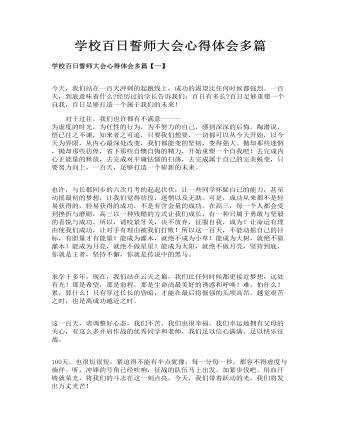
学校百日誓师大会心得体会多篇
也许,与长郡同步的六次月考的起起伏伏,让一些同学怀疑自己的能力,甚至动摇最初的梦想,让我们觉得彷徨,迷惘以及无助。可是,成功从来都不是轻易获得的,轻易获得的成功,不是有含金量的成功。在高三,每一个人都会受到挫折与磨砺,高三以一种残酷的方式让我们成长,有一种只属于勇敢与坚毅的喜悦与成功。所以,请咬紧牙关,决不放弃,征服自我,成为!让命运有理由使我们成功,让对手有理由被我们打败!所以这一百天,不能动摇自己的目标,有胆量才有能量!能成为灌木,就绝不成为小草!能成为大树,就绝不做灌木!能成为月亮,就绝不做星星!能成为太阳,就绝不做月亮,坚持到底,你就是王者,坚持不懈,你就是传说中的黑马。
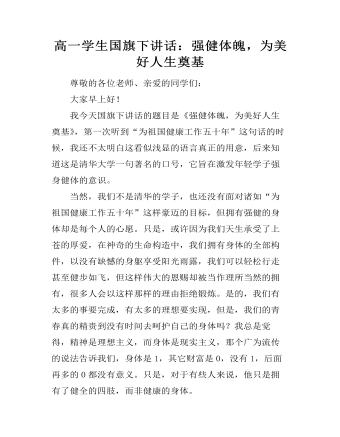
高一学生国旗下讲话:强健体魄,为美好人生奠基
尊敬的各位老师、亲爱的同学们:大家早上好!我今天国旗下讲话的题目是《强健体魄,为美好人生奠基》,第一次听到“为祖国健康工作五十年”这句话的时候,我还不太明白这看似浅显的语言真正的用意,后来知道这是清华大学一句著名的口号,它旨在激发年轻学子强身健体的意识。当然,我们不是清华的学子,也还没有面对诸如“为祖国健康工作五十年”这样豪迈的目标,但拥有强健的身体却是每个人的心愿。只是,或许因为我们天生承受了上苍的厚爱,在神奇的生命构造中,我们拥有身体的全部构件,以没有缺憾的身躯享受阳光雨露,我们可以轻松行走甚至健步如飞,但这样伟大的恩赐却被当作理所当然的拥有,很多人会以这样那样的理由拒绝锻炼。是的,我们有太多的事要完成,有太多的理想要实现,但是,我们的青春真的精贵到没有时间去呵护自己的身体吗?我总是觉得,精神是理想主义,而身体是现实主义,那个广为流传的说法告诉我们,身体是1,其它财富是0,没有1,后面再多的0都没有意义。只是,对于有些人来说,他只是拥有了健全的四肢,而非健康的身体。
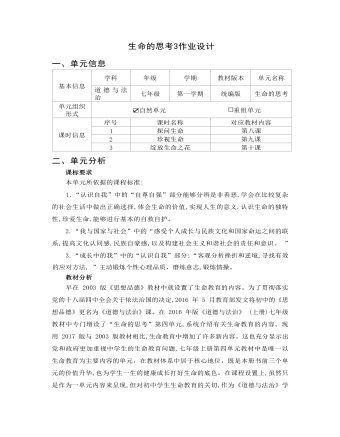
初中道德与法治七年级上册生命的思考3作业设计
一、单项选择题1.C 此题考查生命的特点,AD 选项前面说的都对,但是后面说的都不对。因为: 人生难免风险、挫折和坎坷,是逃离不了的,拒绝不了的。生命是独特的,不能 相互替代,所以 B 也是错的。C 符合题意正确。 2.①②③都体现对生命的尊重和敬畏,而④表达的是一种消极避世的人生态度 ; 因此错了。所以,正确答案 D。3.最美逆行不是没有安全意识,相反,他们能做到敬畏生命,坚持生命至上。因 此,②选项错了,其他选项都符合题意。所以正确答案是 D。4. (1) 主题是:敬畏生命(2) 图 1,祭奠生命,表达对逝者的追悼和怀念。这么做是为了悼念生命,体 现对生命的尊重,体会生命之间是息息相关的。图 2,生命是崇高的、神圣的,是任何代价都换取不来的。我们对生命要有一种 敬畏的情怀。
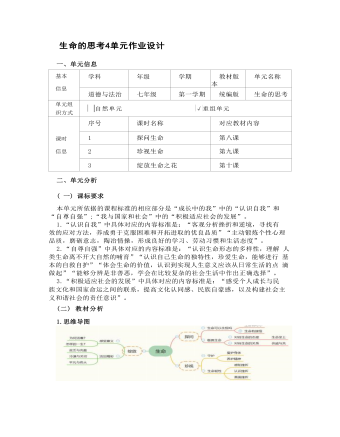
初中道德与法治七年级上册生命的思考4作业设计
①②③分析题干中,我们生命的意义不在于长短,而在于对社会的贡献,将个体生 命和国家的甚至人类的命运联系在一起时,生命就会闪耀出伟大,活出自己的精彩,让 生命更加绚烂,故①②③说法符合题意;④“追求生命个性和韧性”说法不符合主题故 ④说法错误;2.C【设计意图】该题考查呵护食品安全,珍爱生命。 ④说法虽然正确的,但是主体不符,不是市民的做法。故不能入选。 3.A【设计意图】本题考查对生命的传承。①②④材料中的话意在告诉我们,在人类生命的接续中,我们应该为自己的生命找 到一个位置,担当一份使命;在生命的传承关系中,我们应该正确认识和面对自己的生 命;我们每个人都不仅仅是在身体上接续祖先的生命,也在精神上不断继承和创造人类 的文明成果,故①②④说法正确;③生命属于我们每个人,生命的接续和发展与我们每 个人息息相关,故③说法错误。

初中道德与法治七年级上册生命的思考作业设计
B 等级——较积极参与采访活动;采访思路较清晰,记录较完整;能对自己的生 命观、价值观有所反思;能主动展示心得体会。C 等级——基本上能参与采访活动,遇到困难会想放弃;记录信息较少,只有少 量与主题有关;对自己生命观、价值观理解不深;有一点成果反馈,内容过于简 单。总体评价结果: (四) 作业分析与设计意图这是一项基于素质教育导向的整体式课时作业设计,以培养学生核心素养为 目标。作业以学生的“生命故事访谈”为主要情境,以填写活动记录的形式呈现。 教师从“参与态度、思想认识”等四个维度对作业进行评价,以“优秀、 良好、 合格”三个等级呈现。本次实践性作业是访谈型作业,课前采访希望通过学生的 参与,一方面锻炼学生的人际交往能力和口头语言表达能力,另一方面扩展学生 的生活阅历,从他人的精彩故事中获得启示,激发学生对生命的热情,树立正确 的人生观,同时也为下一框题的“平凡与伟大”提供教学素材,活出自己生命的 精彩。
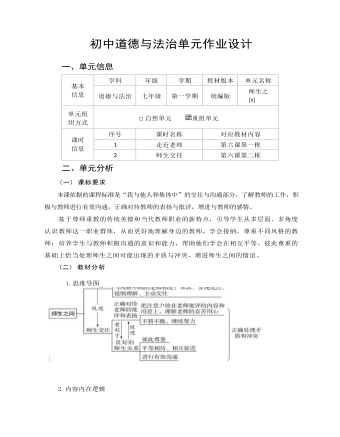
初中道德与法治七年级上册师生之间作业设计
第六课“师生之间”是七年级上册第三单元第一课。本课基于初中学生自我意识 增强、思维能力发展的特点,着力处理青春期的独立性与依赖性的矛盾,帮助学生深 入认识和理解自己的老师。在感受老师对自己的关爱和教育的同时,学会主动关心、 帮助老师,与老师建立一种良好的师生关系。本课与第七课“亲情之爱”内容继承了 孝亲敬长的中华传统美德,落实了社会主义核心价值观的基本内容,指引学生正确处 理师生关系、亲子关系和家庭关系,是初中学生人际交往的拓展与延伸。第一框“走近老师”,从教师的职业特点和责任使命等角度,引导学生进一步了解 老师,理解老师的不易,培养尊敬老师的情感,学会积极接纳不同风格的老师,为学 习第二框的内容奠定情感基础。第二框“师生交往”,引导学生懂得“教学相长”的道理,强调师生之间的双向互动,引导学生正确对待老师的引领和指导,全面认识师生交往的实质,努力建立和谐 的师生关系,达到师生交往理想而美好的状态。
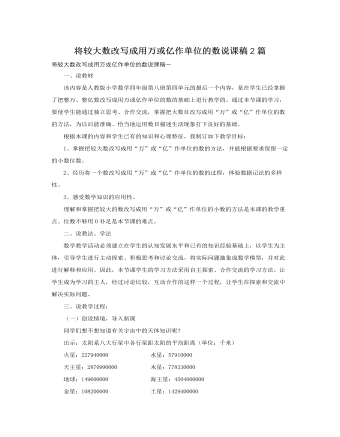
人教版新课标小学数学四年级下册将较大数改写成用万或亿作单位的数说课稿2篇
一、说教材该内容是人教版小学数学四年级第八册第四单元的最后一个内容,是在学生已经掌握了把整万、整亿数改写成用万或亿作单位的数的基础上进行教学的。通过本节课的学习,要使学生能通过独立思考、合作交流,掌握把大数目改写成用“万”或“亿”作单位的数的方法,为以后能准确、恰当地运用数目描述生活现象打下良好的基础。根据本课的内容和学生已有的知识和心理特征,我制订如下教学目标:1、掌握把较大数改写成用“万”或“亿”作单位的数的方法,并能根据要求保留一定的小数位数。2、经历将一个数改写成用“万”或“亿”作单位的数的过程,体验数据记法的多样性。3、感受数学知识的应用性。理解和掌握把较大的数改写成用“万”或“亿”作单位的小数的方法是本课的教学重点。位数不够用0补足是本节课的难点。
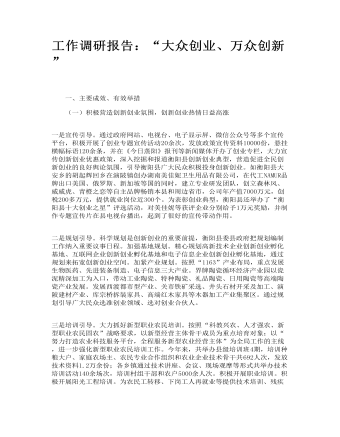
工作调研报告:“大众创业、万众创新”
二是规划引导。科学规划是创新创业的重要前提,衡阳县委县政府把规划编制工作纳入重要议事日程。加强基地规划。精心规划高新技术企业创新创业孵化基地、互联网企业创新创业孵化基地和电子信息企业创新创业孵化基地,通过规划来拓宽创新创业空间。加紧产业规划。按照“1163”产业布局,重点发展生物医药、先进装备制造、电子信息三大产业。界牌陶瓷循环经济产业园以瓷泥精深加工为入口,带动工业陶瓷、特种陶瓷、礼品陶瓷、日用陶瓷等高端陶瓷产业发展。发展西渡都市型产业、关市铁矿采选、井头石材开采及加工、演陂建材产业、库宗桥拆装家具、高端红木家具等木器加工产业集聚区。通过规划引导广大民众选准创业领域、选对创业合伙人。


